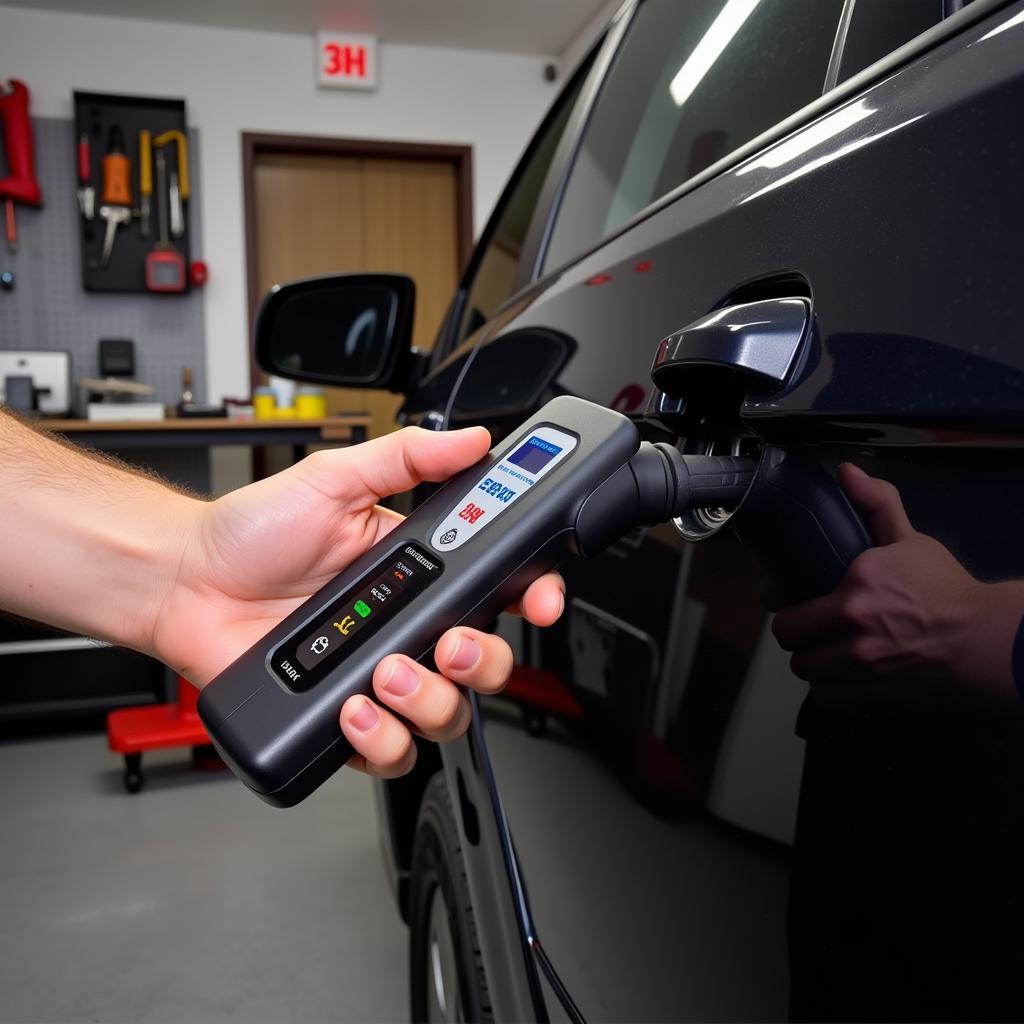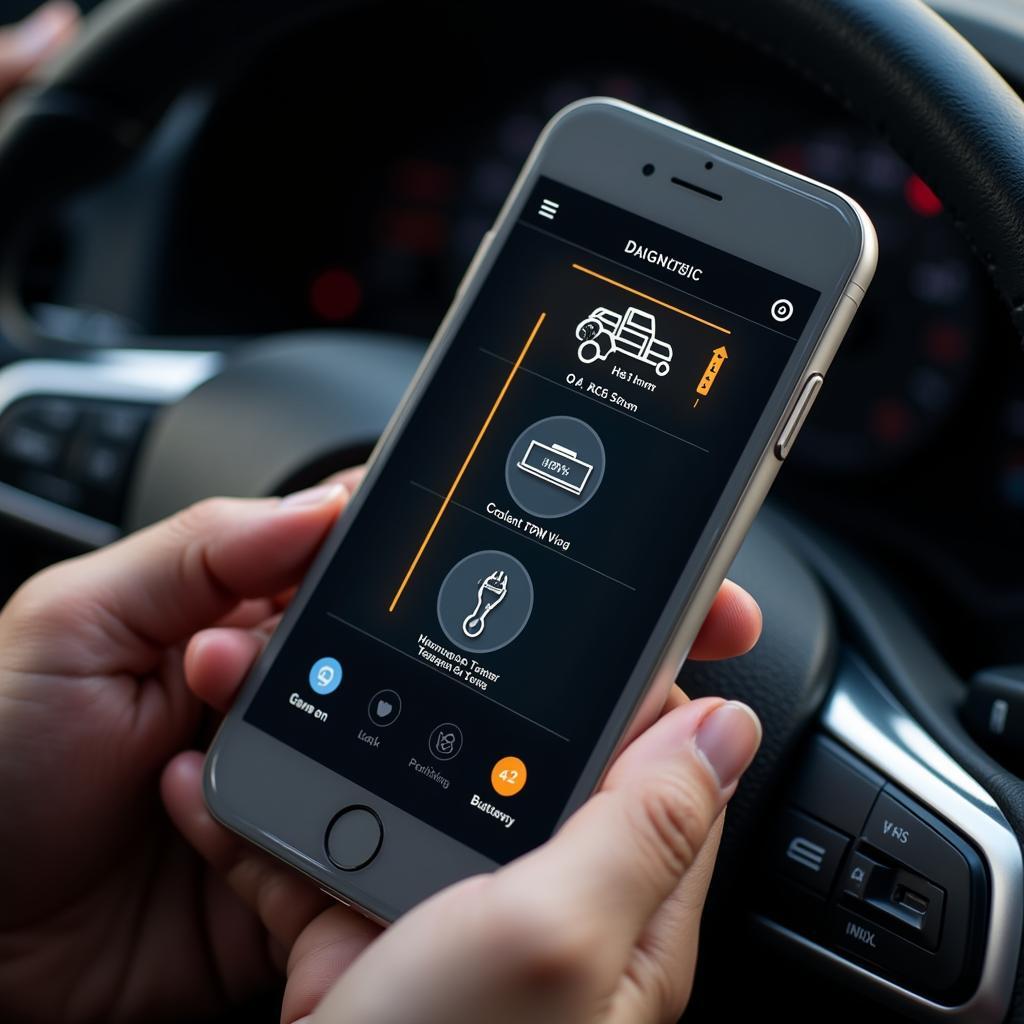Navigating the world of car diagnostics can feel overwhelming, especially with the sheer number of tools available. Finding the Best Wireless Car Diagnostic Tool for your needs, whether you’re a DIY enthusiast or a seasoned mechanic, is crucial for efficient and accurate vehicle maintenance.
 Best Wireless Car Diagnostic Tools for DIY Mechanics
Best Wireless Car Diagnostic Tools for DIY Mechanics
What to Look for in a Wireless Car Diagnostic Tool
Before diving into specific products, let’s clarify what features make a wireless car diagnostic tool stand out:
- Compatibility: Ensure the tool supports your vehicle’s make, model, and year. Most modern tools are compatible with the standard OBD-II port found in vehicles manufactured after 1996.
- Functionality: Determine what you need the tool to do. Do you want to read and clear basic engine codes or delve into more advanced functions like ABS, airbag, and transmission diagnostics?
- User Interface: A user-friendly interface is essential, especially for beginners. Look for tools with intuitive apps, clear navigation, and easy-to-understand data presentation.
- Software Updates: Regular software updates are crucial for ensuring compatibility with the latest vehicle models and fixing any potential bugs.
- Additional Features: Some tools offer extra features like live data streaming, graphing capabilities, and even maintenance reminders, enhancing their value.
 Wireless Car Diagnostic Tool Smartphone App
Wireless Car Diagnostic Tool Smartphone App
Top Wireless Car Diagnostic Tools on the Market
Now that you understand the key features, let’s explore some of the top-rated wireless car diagnostic tools:
1. BlueDriver Professional OBD2 Bluetooth Scanner
This tool consistently receives high praise for its comprehensive functionality and user-friendly interface. The BlueDriver app provides detailed code definitions, repair reports, and even links to relevant repair information online. Its ability to access manufacturer-specific codes makes it a powerful tool for both DIYers and professionals.
Key Features:
- Reads and clears all OBD-II codes
- Accesses manufacturer-specific codes
- Generates repair reports
- Offers live data streaming and graphing
- User-friendly app with free updates
2. ANCEL FX2000 Vehicle Code Reader
The ANCEL FX2000 stands out for its wide system coverage, allowing you to diagnose issues beyond the engine. It’s a great option for those who want a more advanced tool capable of handling various car systems.
Key Features:
- Performs all 10 modes of OBD-II diagnostics
- Covers ABS, SRS (Airbag), Transmission, and more
- Provides live data streaming in text and graph format
- Offers multilingual support
- One-year warranty and lifetime free updates
3. OBDLink LX Bluetooth OBD-II Scanner
This compact and affordable tool is perfect for casual users and DIY enthusiasts. It offers all the basic functions you need to diagnose and clear engine codes, while its intuitive app makes it incredibly easy to use.
Key Features:
- Reads and clears all OBD-II codes
- Provides code definitions and possible causes
- Offers live data monitoring
- Compatible with both Android and iOS devices
- Budget-friendly option
Benefits of Using a Wireless Car Diagnostic Tool
Investing in a wireless car diagnostic tool offers several advantages:
- Early Problem Detection: You can identify potential issues before they escalate into major repairs, saving you time and money in the long run.
- DIY Repairs: For the mechanically inclined, these tools empower you to diagnose and even fix some car problems yourself.
- Informed Decisions: When faced with a mechanic’s diagnosis, you’ll have a better understanding of the issue and can make more informed decisions about repairs.
- Enhanced Vehicle Knowledge: Regularly using a diagnostic tool provides valuable insights into your car’s health and performance over time.
Wireless vs. Wired Car Diagnostic Tools: What’s the Difference?
While both types perform similar functions, the main difference lies in their connectivity. Wired tools connect directly to the car’s OBD-II port via a cable, while wireless tools use Bluetooth or Wi-Fi to communicate with your smartphone or tablet.
Wireless tools offer greater flexibility and convenience, allowing you to move freely around your vehicle while diagnosing. They eliminate the hassle of tangled cables and provide a more seamless user experience.
Conclusion
Choosing the best wireless car diagnostic tool empowers you to take control of your vehicle’s maintenance and make informed decisions about repairs. Whether you’re a DIY enthusiast or prefer leaving repairs to the professionals, a reliable diagnostic tool is a valuable investment for any car owner.
By carefully considering your needs, budget, and the key features discussed, you can find the perfect tool to keep your car running smoothly for years to come.

Leave a Reply